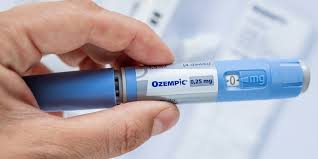What to Expect Mentally and Emotionally While Using Ozempic Injection
The physical benefits of the Ozempic injection—like reduced appetite, weight loss, and improved blood sugar control—are widely known. But there’s another, less discussed side of this treatment: its mental and emotional impact.
Whether you’re starting the Ozempic injection for managing type 2 diabetes or weight loss, it’s essential to prepare not only for the physical changes, but also for how it may shift your relationship with food, body image, self-discipline, and mental well-being.
This blog explores what to expect emotionally, how it might change your mindset around eating, and ways to stay grounded throughout the journey.
🧠 How Ozempic Affects the Mind
The Ozempic injection influences appetite-regulating areas of the brain, including the hypothalamus and reward system. By mimicking the GLP-1 hormone, it creates signals of satiety and decreases food cravings. But the effects don’t stop at hunger.
Mental and emotional responses often reported:
Relief from obsessive food thoughts
A sense of empowerment from reduced cravings
Mood shifts from blood sugar stability
Emotional adjustment to new eating behaviors
These experiences can feel freeing, confusing, or even overwhelming—depending on your mental state before starting treatment.
💡 Positive Psychological Effects of Ozempic Injection
1. Freedom from Food Obsession
Many users say that for the first time in years, they aren’t constantly thinking about what to eat next. This mental space creates:
Less stress around food decisions
More energy for daily tasks and relationships
Relief from binge-eating patterns
2. Improved Self-Control
Since Ozempic injection reduces impulsive hunger, people find it easier to say no to unhealthy foods. This increases:
Self-trust in making healthier choices
Discipline that feels natural, not forced
Long-term behavior changes
3. Stabilized Mood
Blood sugar fluctuations are linked to mood swings, irritability, and brain fog. With better glucose control, users often experience:
Balanced energy
Clearer thinking
Fewer emotional crashes
4. Boost in Confidence
As clothes fit better and numbers on the scale drop, it naturally leads to:
Increased self-esteem
More motivation for exercise
Positive reinforcement for continued progress
⚠️ Potential Mental and Emotional Challenges
While the benefits are clear, not everyone experiences a smooth emotional transition. Here are some common mental hurdles:
1. Loss of Emotional Comfort from Food
For people who relied on food to cope with stress, sadness, or boredom, Ozempic injection removes the desire to eat—but not the emotion itself.
You may experience:
Emotional emptiness where food used to comfort
Anxiety from new coping skills being required
Frustration at not feeling hungry but still feeling sad
Tip: Work with a therapist or counselor if emotional eating has been your default strategy.
2. Body Image Shock
As the body changes, it can trigger unexpected feelings:
Old insecurities resurfacing
Fear of losing your “identity” as a larger person
Discomfort receiving attention or compliments
It takes time for your mind to catch up with your physical transformation.
3. Guilt Around Eating
Some users feel guilty eating anything indulgent, even in moderation. This can develop into:
Overly restrictive thinking
Disordered eating patterns
Fear of “ruining progress”
Ozempic is a tool—not a punishment. Balanced enjoyment of food is still healthy and necessary.
🧭 Navigating Mental & Emotional Shifts With Awareness
Change is never only physical—it always affects your mindset. Here are proactive ways to emotionally support your Ozempic journey:
📝 1. Journal Your Experience
Track more than weight—track:
Your mood before/after meals
Thoughts around hunger
Emotional triggers without food
This helps you identify patterns and emotional growth over time.
💬 2. Talk About It
Whether through therapy, support groups, or friends, sharing how you feel can help you:
Normalize your experience
Feel less alone
Receive guidance when stuck
🧘 3. Practice Mindfulness
Use mindful eating or breathing techniques to reconnect to your body’s signals. It helps:
Stay present during meals
Make intentional food choices
Process emotions instead of suppressing them
🧩 4. Create New Coping Tools
If food is no longer a comfort, try:
Walking or light exercise
Drawing, reading, or music
Talking to a friend or journaling
Replacing emotional eating with healthy habits builds long-term resilience.
🔄 The Mind-Body Loop: How Mental Health Supports Physical Success
| Mental Effect | Physical Outcome |
|---|---|
| Reduced anxiety | Better sleep and lower cortisol |
| Improved self-confidence | More consistent exercise |
| Less food guilt | Balanced nutrition without restriction |
| Emotional support | Longer commitment to injections |
❓ FAQs on Mental Health and Ozempic Injection
❓ Can Ozempic cause depression or anxiety?
While not common, a small number of users report mood changes. These are often linked to the emotional impact of eating less, not the medication itself. Consult your healthcare provider if you notice persistent low mood.
❓ Will I still enjoy food on Ozempic?
Yes—just differently. You may feel satisfied with smaller portions and no longer crave intense flavors. Taste preferences often shift toward healthier foods.
❓ Is it normal to feel emotionally “flat”?
Some users say they feel emotionally neutral—less excited about food but also less reactive to stress. This balance can feel odd at first but usually becomes comfortable.
❓ Should I take Ozempic without therapy if I have a history of emotional eating?
Therapy is highly recommended if food has been your emotional crutch. Ozempic removes the behavior, but not the emotional need. Combining both supports lasting change.
✅ Final Thoughts: Embracing the Mental Journey
The Ozempic injection is more than a metabolic treatment—it’s a mental reset. As your appetite quiets and your cravings diminish, you may uncover deeper emotions, patterns, and questions around food.
That’s a gift—an opportunity to rebuild your relationship with eating, your body, and your mind.
Stay patient. Stay curious. Celebrate small victories—not just in pounds lost, but in peace gained.
